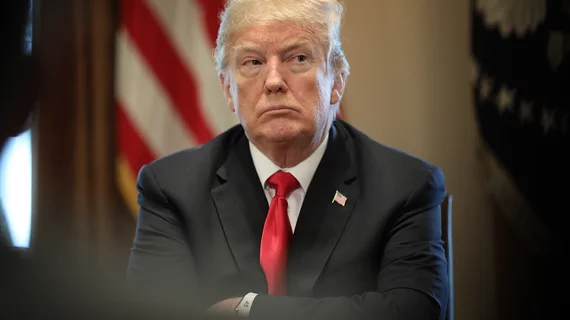Trump postpones healthcare debate until after 2020
In a series of late-night tweets published April 1, President Trump suggested Republicans’ proposed replacement for the Affordable Care Act will be put to a vote after the 2020 election, edging healthcare out of the spotlight just a week after his administration backed a federal judge’s ruling to invalidate the whole law.
“Everybody agrees that ObamaCare doesn’t work,” Trump tweeted. “Premiums & deductibles are far too high - really bad HealthCare!”
He asserted Republicans are in the process of developing a “really great HealthCare Plan” with lower premiums and deductibles than the ACA allows, noting in another tweet deductibles can exceed $7,000, making the ACA “almost worthless or unusable.” He tagged Senators Rick Scott, John Barrasso and Bill Cassidy in the post shortly after having tapped Scott to lead the renewed healthcare push.
“It will be truly great HealthCare that will work for America,” Trump wrote. “Also, Republicans will always support Pre-Existing Conditions. The Republican Party will be known as the Party of Great HealtCare [sic].”
Pre-existing conditions protections were a point of contention after CMS issued new policies last October allowing states to circumvent some patient protections. A statement penned by industry groups including the American Heart Association, American Diabetes Association and National Health Council said the guidance allowed states “to approve the sale of cheap, inadequate health insurance plans that can eliminate coverage of pre-existing conditions, charge premiums based on health status or reject patients altogether.”
More than 100 million Americans qualify as having a pre-existing condition, and on Oct. 18 Trump tweeted that “all Republicans support people with pre-existing conditions, and if they don’t, they will after I speak to them.” He pledged his support even after his administration had announced several months earlier it would no longer support those protections under the ACA.
Trump’s latest announcement also comes a week after his administration filed a notice supporting a Texas judge’s ruling to throw out the ACA in its entirety—a pivot from their previous stance that only parts of the law should be invalidated.
“I don’t really know why they would do this now,” Alison Kodjak, a health correspondent for NPR, said on Morning Edition March 26, noting the ACA gained a lot of traction with voters in the midterms. “Politically, trying to take this law away and really upend the whole healthcare system could be pretty tricky and dangerous politically for the Trump administration and for Republicans who support this legal case.”

